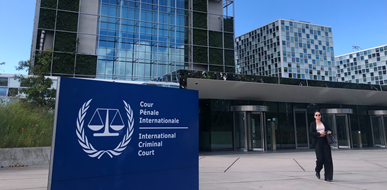[Interview] Acting academic director Christophe Paulussen: "It's precisely because the ICC holds power to account that it faces resistance"
Published 10 February 2025
As sanctions against the International Criminal Court (ICC) escalate and global leaders increasingly defy international conventions, the foundations of global justice face their greatest test in decades. Christophe Paulussen, acting academic director and chairperson of the executive board of the Asser Institute, warns of a dangerous shift in world order where power politics threatens to override established legal frameworks. “While one could reasonably argue that the ICC is facing an existential crisis because of these challenges, one could also assert they actually demonstrate its effectiveness – it's precisely because the court is holding powerful figures accountable that it's facing such resistance.” An interview.
U.S. president Donald Trump signed an executive order last Thursday imposing sanctions against ICC employees. What practical impact could these sanctions have on the ICC's operations?
"As my colleague, PhD researcher James Patrick Sexton, whose thesis examines the interaction between sanctions and international criminal justice, pointed out well in the media, these sanctions could cripple the court's operations. Not only will the work of the court become more difficult because of asset freezes and travel bans, but targeting the prosecutor with sanctions, as is anticipated, would also jeopardise investigations into alleged crimes in conflict zones such as Afghanistan, Ukraine, and Sudan. This would seriously undermine an institution that is designed to fight impunity for perpetrators of the most serious crimes of concern to the international community as a whole, crimes that threaten global peace and security."
How significant is this development?
"The sanctions against ICC officials in The Hague represent a deeply troubling escalation in the ongoing undermining of international law. We are witnessing a dangerous shift where certain leaders seem to be prioritising their personal power over established legal frameworks. This is a critical moment that demands a strong response from all nations committed to international cooperation and legal order."
Are these sanctions an isolated incident, or do you see them as part of a broader pattern?
"They're definitely part of a larger pattern of actions aimed at gradually eroding the system of international cooperation and legal order. From Trump’s withdrawal from both the Paris Agreement and the World Health Organization, to his illegal proposal regarding forced displacement in Gaza and the bizarre attempt to purchase Greenland: these actions reflect a worldview where international law is seen not as a framework for cooperation, but as an inconvenient obstacle to raw power politics."
How is this attitude affecting other nations' behaviour?
"What’s particularly concerning is how the undermining of international law is resonating beyond U.S. borders. Look at Italy's recent release of Osama Elmasry Njeem, suspected of crimes against humanity and war crimes, citing supposed 'errors and inaccuracies' in the ICC arrest warrant. Or consider how Poland and France – also ICC member states – indicated they would grant immunity to Benjamin Netanyahu despite allegations of war crimes and crimes against humanity. While one could reasonably argue that the ICC is facing an existential crisis because of these challenges, one could also assert that they actually demonstrate its effectiveness – it's precisely because the court is holding powerful figures accountable that it's facing such resistance."
What's driving this hostility towards international law?
"Looking at Trump specifically, what we're seeing is a worldview which includes a strong transactional dimension. Countries are treated as mere 'commodities': to be bought, traded, or conquered. This neo-colonial and neo-imperialist mindset, evident in his absurd suggestions regarding Greenland, Gaza and Panama, represents a massive regression in thinking about international relations and basic norms such as the prohibition of the threat or use of force. What binds leaders like Trump and Netanyahu seems to be their singular focus on maintaining power, regardless of the cost to international stability and human rights."
What needs to be done to protect the international legal order?
"It is important that all 125 ICC member states and other nations that value international cooperation unite in its strong defence. We need evidence-based policymaking rather than political symbolism, international solidarity rather than narrow nationalism, and a focus on the public interest rather than the private interests of oligarchs. This isn't just about defending specific institutions like the ICC – it's about preserving the fundamental idea that international law matters.
Last Friday, the ICC’s president judge Tomoko Akane issued a statement declaring that the ICC continues to stand firmly by its personnel and continues to provide justice and hope to millions of innocent victims of atrocities across the world, while calling upon its 125 states parties, civil society and all nations of the world to defend the court.
Fortunately, we've seen a significant show of solidarity from the international community in response to the ICC sanctions. Nearly eighty countries, including major powers like France, Germany and the United Kingdom, as well as the ICC’s host country the Netherlands, have indeed issued a joint statement expressing their 'unwavering support' for the court’s independence, impartiality, and integrity. These countries emphasise the ICC's vital role in ensuring accountability for the most serious international crimes and securing justice for victims. However, it is telling that this group represents only about two-thirds of the ICC's 125 member states, with notable absences including Australia, the Czech Republic, Italy and New Zealand. This mixed response highlights the ongoing challenges the court faces in maintaining unified international support, even among its own member states."
What's your final message about the importance of maintaining international law?
"International law and its institutions are essential tools for addressing global challenges, maintaining peace and security, fighting impunity, and protecting human rights. Their effectiveness depends not just on institutional strength, but on nations' collective will to defend and uphold them. It's crucial that all countries believing in international cooperation and legal order unite now to present a powerful counter-response. The time to act is now. We need law, not war, as international criminal law champion Benjamin Ferencz used to say."
